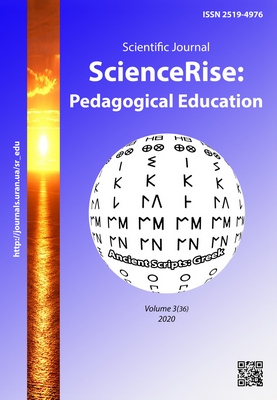Methodological development of educator’s information and communication mobility as adaptive ability of educational and developing e-environment self-organization
DOI:
https://doi.org/10.15587/2519-4984.2020.200468Keywords:
information and communication mobility, educational e-environment, adaptive ability, design of educational environment, andragogical educationAbstract
The phenomenon of globalization and the active use of the capabilities of information and communication technologies affect the social atmosphere and the economic situation in society. The aim of the study is to determine the adaptability of a teacher to modern challenges in the context of improving the human potential, the innovativeness of the educational environment and the process of work.
The actualization of the self-development value of a person is caused by the emergence of new forms of learning, advanced training and ways of modern communication. There is a public need for educators with a high level of information and communication mobility, able to provide a quality learning process in an educational setting.
The article describes the approaches to the organization of teacher development in the educational environment with the use of information and communication technologies. Methodical approaches to the development of teacher mobility as an adaptive capacity are indicated. Information and communication mobility is defined as the adaptive capacity of educational and development e-environment self-organization, its structure and levels. The methodology of teacher’s information and communication mobility development, tasks that are realized in the educational e-environment of postgraduate education are characterized.
To carry out the experimental work the author's program of development of the teacher's adaptive ability was developed, which envisages preparatory, activity, creative stages of realization.
The educational and methodological support for the implementation of the author's methodology for the development of the teacher's ICM provides the developed electronic educational and development environment.
The educational e-environment envisages increased opportunities for the individual’s activity, development of new ways of interaction with the environment, represented by life events, focus on ensuring access of adults to the flow of knowledge, focus on instrumental equipment and expanding their own educational space as a component of continuous education.
The integrated use of theoretical and empirical methods (testing, conversation, observation, interviewing, self-assessment, self-evaluation) allowed us to find out the initial level of information and communication mobility of a teacher, to determine the impact of the educational environment of postgraduate education and the development of teacher’s adaptive ability.
The research allowed to determine the features of educational environment design: continuity, multilevel, developmental character of learning, openness, in which such educational values of lifelong adult education, such as self-organization, self-development, self-education, self-control, are actualized.
Prospects for the study of the problem are associated with the development of conditions for the development of information and communication mobility in the electronic environment of inclusive education
References
- Vinevskaya, A. (2012). Using the potential of information technology to create a mobile learning environment. GESIS – Leibniz Institute for the Social Sciences: Koncept, 9. Available at: https://www.ssoar.info/ssoar/handle/document/32078
- Mitchell, W. J., Borroni-Bird, C. E., Burns, L. D. (2010). New Mobility Markets. Reinventing the Automobile: Personal urban mobility for the 21st century. Cambridge: The MIT Press. doi: http://doi.org/10.7551/mitpress/8490.003.0009
- Algaev, A. N. (2012). Communicative mobility in educator-psychologist’s job description structure. Modern problems of science and education, 6, 375–382.
- Voronovskaya, L. P. (2015). Structure of professional mobility of a utility sector specialist. Austrian Journal of Humanities and Social Sciences, 7-8, 36–39. doi: http://doi.org/10.20534/ajh-15-7.8-36-39
- Bykov, V. Yu. (2012). Innovatsiinyi rozvytok zasobiv i tekhnolohii system vidkrytoi osvity. Suchasni informatsiini tekhnolohii ta innovatsiini metodyky u pidhotovtsi fakhivtsiv: metodolohiia, teoriia, dosvid, problemy, 29, 32–40.
- Bugaychuk, K. L. (2012). Mobile learning: essence and models of introduction in educational process of higher educational establishments MIA OF Ukraine. Informatsiini tekhnolohii i zasoby navchannia, 27 (1). Available at: https://journal.iitta.gov.ua/index.php/itlt/article/view/619/480
- Neliepova, A. V. (2011). Metodyka formuvannia informatsiinoi mobilnosti maibutnikh ahronomiv-doslidnykiv. Kyiv, 22.
- Kuzminska, O. H. (2010). Zabezpechennia umov nabuttia profesiinoi kompetentnosti pedahohiv v umovakh informatsiinoho suspilstva. Nova pedahohichna dumka, 2, 107–111.
- Antonova, O. Y., Familiarska, L. L. (2019). Study of the development of the teacher’s information and communication mobility within the system of postgraduate education. Zhytomyr Ivan Franko State University Journal. Рedagogical Sciences, 1 (96), 58–65. doi: http://doi.org/10.35433/pedagogy.1(96).2019.58-65
- Kloyts, L. A. (2019). Study of developmentof professional self-definition of modern pedagogue. Aktualni problemy psykholohii, 4 (15), 75–92.
- Sorokina, A. I. (2013). Psychological features of professional mobility of young specialists of the Russian Federation. Actual problems of studying of professional mobility and sense of justice of young professionals, 73.
- Weber, M. (2012). Future Mobility: Interview with Robin Chase (Buzzcar, Paris). Checkdisout. Available at: http://checkdisout.com/2012/01/16/checkdisout-6-future-mobility-interview-with-robin-chase-buzzcar-paris/
Downloads
Published
How to Cite
Issue
Section
License
Copyright (c) 2020 Larissa Familyarska, Lybov Klots

This work is licensed under a Creative Commons Attribution 4.0 International License.
Our journal abides by the Creative Commons CC BY copyright rights and permissions for open access journals.
Authors, who are published in this journal, agree to the following conditions:
1. The authors reserve the right to authorship of the work and pass the first publication right of this work to the journal under the terms of a Creative Commons CC BY, which allows others to freely distribute the published research with the obligatory reference to the authors of the original work and the first publication of the work in this journal.
2. The authors have the right to conclude separate supplement agreements that relate to non-exclusive work distribution in the form in which it has been published by the journal (for example, to upload the work to the online storage of the journal or publish it as part of a monograph), provided that the reference to the first publication of the work in this journal is included.








